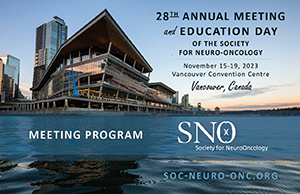Call for Abstracts
28th Annual Meeting and Education Day of the Society for Neuro-Oncology
November 15 - 19, 2023
Abstract Acceptances and Allocation Emails were sent out on Monday, August 7th, 2023.
- General Abstract Deadline was Friday, June 9, 2023, 11:59pm EDT.
- Late Breaking Abstract Deadline: Monday, September 4, 2023, 5:00pm EDT.
Abstracts submitted to this category that do not fit the description criteria, will be withdrawn. For information and special guidelines on Late-Breaking Abstracts, click here.
*Please use the web browser Google Chrome when submitting an abstract. In order to successfully submit your abstract, you must click on the "SUBMIT" button. - All accepted abstracts will be published in SNO’s official journal, Neuro-Oncology. Abstracts cannot be edited or changed after the June 9th deadline.
- Once the accepted abstracts are submitted to the journal for publication, requests for withdrawals cannot be processed. All request to withdraw abstracts MUST be received by Wednesday, August 16, 2023, at 11:59 PM ET.
- Embargo Details:
- The embargo for abstracts published in the 2023 abstract supplement to SNO official journal Neuro-Oncology will lift on Friday, November 10, 2023.
- The embargo for accepted Late-Breaking abstracts will lift at 7:00 AM (PT) on the day of presentation.
- All accepted abstracts will be published and made available at: https://academic.oup.com/neuro-oncology/supplements.
- Presentation Recording Onsite:
- SNO will record all "live" slide presentations (with accompanying audio and video) during the meeting.
- Select presentations will be featured on the SNO Education Site and will be made available for online viewing.
- Traditional Poster Presentations:
- An in-person poster session will take place at the Annual Meeting. More details will be sent to the accepted poster presenters.
- Electronic Poster Presentations:
- Files will be captured electronically (in PDF) prior to the meeting and available on the mobile meeting app, website and onsite.
- Presenters will be given full credit for their presentations. For the purpose of Neuro-Oncology, Neuro-Oncology Practice, and other scholarly journals, presentation in either of these forums is not considered "prior publication."
- Registration Requirements: If your abstract is accepted for presentation at the 2023 SNO Annual Meeting, the presenting author is required to register for the meeting by the presenter registration deadline. If the presenting author does not register for the SNO Annual Meeting by this deadline, their abstract could be withdrawn from the program and will not be published in the Neuro-Oncology abstract supplement. Additional registration details will be provided in the acceptance email.
- Abstract submitters and attendees should not anticipate an option for remote participation.
- Abstract Title:
- Should be sentence case (i.e., only the first letter of the title should be capitalized)
- Should be plain text (No html)
- Word Limit: 75 words/ 200 characters
- Abstract Body:
- Word Limit: 300 words
- Figures and tables are not allowed
- Should be in a single paragraph
- If subheaders are used, they should be within that single paragraph in all-caps, not bolded (e.g., METHODS:)
- If you use the greater than/equal to symbol, you MUST put a space before entering the number.
- Abstracts should be data-driven and must include this information in the body of the abstract.
- Please be sure to carefully check your abstract for content errors, spelling, names, etc. before submitting. SNO neither proofreads for nor corrects spelling, typographical, grammatical, or scientific errors.
- Authors:
- There can only be 1 presenting author per submission.
- In the the case that a presenter is unable to present, we will allow a co-author to present in their place, but we will be unable to make any edits to the printed journal.
- The presenter must contact the SNO team immeidatedly to let us know of said change.
- There is a maximum of 50 authors per abstract submission.
- Enter the names of authors in the order in which you wish them to appear in the printed text.
- Presenting Authors will need to complete the Presenting Author Task.
- For information and special guidelines on Late-Breaking Abstracts, click here.
- General Guidelines:
- Please make sure your abstract contains only generic drugs names. Abstracts with trade names in the title or body could be precluded from presentation.
- Please be sure to carefully check your submission for content errors. SNO neither proofreads for nor corrects spelling, typographical, grammatical, or scientific errors. Errors made on your submitted abstract are likely to appear in print.
- Please be sure to verify the presenters email address. All communication regarding the abstract will be sent to the presenting author’s email address that was entered at the time of submission.
- If a Conflict of Interest Disclosure is required, you will be contacted directly by a SNO team member.
Please note the following information will be requested of your abstract:
| Submission Type |
||||
|
|
|
|
|
| Abstract Tumor Type |
||
|
|
|
| Abstract Categories |
||
|
|
|
Abstract Questions? Please contact Tara Mammoser at tara@soc-neuro-onc.org
Technical Issues Submitting Your Abstract? Please contact Ginger Vazquez at ginger@soc-neuro-onc.org

